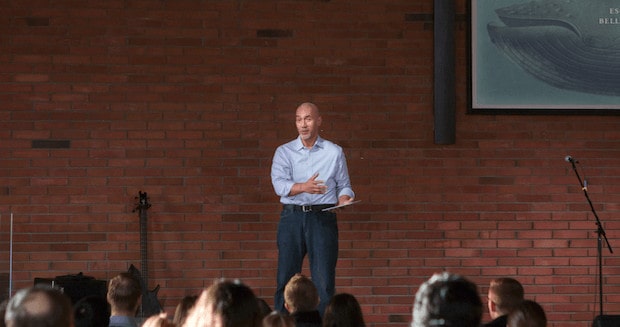It’s the start of Pastor Appreciation Month—one that’s especially deserved after all the extra-long hours and adjustments COVID-19 has brought.
Thank you, pastors!
As you continue feeding your flock, may these three simple tips help you lighten your load and powerfully share the gospel.
***
1. It doesn’t all depend on you
In preaching, it doesn’t all depend on you. For most preachers, this is good news, that is, that our preaching is not solely based on our study, our background, the way we communicate, or even the congregation—the place in which we speak. Really, it’s all about God. We have heard it said that it is all about God. It is all about God. All that we do, all that we have, all that we attempt to do is about God. The act of preaching itself is an act of worship. So what we do as we worship, as we preach, as we communicate God’s Word to God’s people, we do all that we have been required to do (i.e., we work with the text, pray, understand our listeners, exegete them, prepare a sermon that is clear and concise, and communicate God’s Word to them) and then we leave the rest up to God. We give it to God as an act of worship. Preaching is not dependent solely on us. That really is good news. It does not all depend on you as a preacher.
For a lot of us who struggle in contexts where we think people are not hearing what we have to say, we may find out that weeks or years later that what we said and how we said it was something that has been a keen insight and an encouragement for growth for somebody, because it all doesn’t depend on us. And yet, as preachers, we know that we don’t give up the responsibility of doing all the work that we have to do—the study that we are called to do—because of all the gifts that God has given to us. But that is it isn’t it? It is God who gives gifts. It is God who has given us His Word. It is God who does His work.
There is a mystery to preaching that I do not quite understand, because once we stand up to deliver God’s Word, it is set on the hearts of the people. When that happens, as we have prayed that God would work, the flint of God’s Word strikes the steel of people’s lives as Haddon Robinson says, some kind of spark takes place, and God does His work. So be encouraged, preachers. Be encouraged to know that the work that you do (i.e., the study that you do, the way that you stand and communicate to a congregation that you have understood and have tried to intersect with as you clearly communicate God’s Word to them) is well worth doing. It is assuring for us to know that God is the one who does the work. It is true. It is encouraging. It is freeing as well. In preaching, it does not all depend on you.
2. Preach as a dying man to dying men
“I preached as never sure to preach again, as a dying man, to dying men.” You may have heard this statement before. It’s from Richard Baxter who wrote the Puritan classic The Reformed Pastor. He is telling us that every time he stepped into the pulpit he recognized that it could be his last sermon—one day it was. Baxter also recognized that it could be the listener’s last sermon—one day it was. The conviction of human mortality and the brevity of life drove him to speak clearly, with pastoral warmth, as one who kept watch over the souls of his people.
The Bible uses various metaphors for the brevity of life: We are a shadow that passes. The span of our days is a hand-breadth. We are like grass that springs up in the morning but then withers in the afternoon. We are as thin as vapor. We preach to dying men and women.
Baxter understood the brevity of life because he was a pastor. The minister who marries, buries, baptizes, and counsels lives with the awareness that life is brief. So Richard Baxter tells us to consider human mortality—ours and that of our listeners—to ignite our passions as we stand to teach the Word. Meditate on the brevity of your days so that you can preach like Richard Baxter: “as never sure to preach again, as a dying man, to dying men.
3. Be yourself when you preach
This seems almost obvious; but when you stand up to preach, be yourself. Years ago when I first began preaching, the models I had were people who were orators. These were the kinds of folks who were featured at conferences and they would have a sense of speaking to the ages. So I copied them. I remember that after I had been preaching for about a year, a friend of mine who came to hear me said, “You know, it is interesting. When I talked to you on the way out here in the car, you talked one way. When you got up to preach, you talked another way. You are somebody else in the pulpit. You are not the person that I talked to in the car.” I thought about that and I think I began to change to try to be more of myself. When it really came home to me was when I was general director of the Christian Medical Dental Society. I spoke to groups of physicians and dentists. They are a tough audience. They don’t give you a lot of response. You give them your best joke and they show you two teeth. But I discovered that I could not have a strong, declarative way of talking at them. I had to talk with them. I had to interact with them in the way I spoke, in the way I tried to get stuff across. I discovered that they wouldn’t put up with somebody who was a phony, who was one thing when he stood in front of the group and another when he was interacting with them personally.
I don’t think you can afford it. Be yourself when you preach. Be your best self—this is not a plea for sloppiness, for the use of slang, or the use of bad language—but be yourself. Ultimately, what people hear is not a sermon, not an outline. They hear you. So when you stand to speak, help people understand. You’ll be intense because you would be intense if you were speaking across a table to somebody. Don’t be afraid to laugh because you would do that if you were talking to somebody in your office. Don’t make someone else an idol in your life. God made you you. There has never been another person just like you, with your background, with your approach to life, with the things that you have seen and done. Be the same person in the car, at home, and in the pulpit. Therefore, since God has made you you, be yourself when you preach.
***
This post is excerpted from Preaching Points: 55 Tips for Improving Your Pulpit Ministry, edited by Scott M. Gibson, available now from Lexham Press.
***
If you’d like to show your appreciation to a pastor, here’s a flexible option that lets them choose whatever they’d most love on their digital bookshelves—Logos gift cards.







